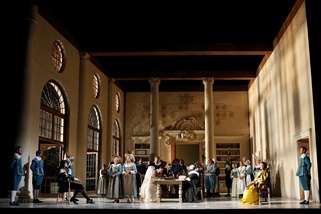|
Back
An ornate delight Melbourne
State Theatre
11/12/2015 - & November 14, 17*, 19, 20, 23, 25, 28, 2015
Wolfgang Amadeus Mozart: Le nozze di Figaro, K. 492
Shane Lowrencev (Count Almaviva), Jane Ede (Countess), Taryn Fiebig (Susanna), Andrew Jones (Figaro), Sian Pendry (Cherubino), Roxanne Hislop (Marcellina), Richard Anderson (Bartolo), Benjamin Rasheed (Don Basilio), Brad Cooper (Don Curzio), Eva Kong (Barbarina), Adrian Tamburini (Antonio), Annabelle Chaffey (First Bridesmaid), Anna Yun (Second Bridesmaid)
Opera Australia Chorus, Thomas Johnson (Acting chorus master), Siro Battaglin (Fortepiano), Orchestra Victoria, Anthony Legge (conductor)
David McVicar (Director), Jenny Tiramani (Set & costume designer), David Finn (Lighting designer)

(© Jeff Busby)
As the second instalment of its new Mozart/DaPonte cycle under the direction of Scottish director Sir David McVicar, Opera Australia’s The Marriage of Figaro is an extravagant, ravishing triumph. After the brooding, gothic melancholy of Don Giovanni, we are treated to another Spain entirely: drenched in sunlight, gorgeously textured stone walls and breezy, billowing pastel drapery. This is a Goya interior – portraits of a household in richly layered colours, brilliantly highlighted by the rays of the sun through massive windows to an exterior. Internationally acclaimed designer Jenny Tiramani has created a masterwork in her first production for OA. The costumes are meticulous to the last tied shoe ribbon. They range from muted blue and white livery for the household to fantasy frock-coat creations in black and silver for the Count and an indulgence of gowns for the Countess including a superb gold evening dress to exchange with Susanna in the final act. Contrastingly, the attendant Dons are black with ruffled collars, sword-carrying dandies who slide and bow their way around the stage. Four massive and elaborate sets create the palace and with the costumes and magnificent lighting, create a richly layered production which must surely be one of the most beautiful and visually satisfying Figaro’s around at present.
As in Don Giovanni, David McVicar visualises a production bursting with details of life. The palace is riddled with hiding places, passages, locked doors and inevitably, people listening at the key holes; confined spaces in which the “little people” observe the goings-on of their betters. Contrast this with the massive dimensions of the rooms – the Countess’ bed chamber occupying the cavernous stage of Melbourne’s State Theatre – and we see social division and the segregation between the aristocracy and the serving classes.
To fill these massive voids, there is much stage business: everything is hustle and bustle; characters pace to and fro; crowds of faces fill windows and action is everywhere. David McVicar has missed not one cue from the libretto. Every comment has its actions and we are treated to a Figaro bursting with life and at a pace which has all four acts fly past at a wild speed. This technique not only brings the comedy to life but emphasises the social and sexual nature of the politics at play. It is easy to see why the play was originally banned as threatening the rights and privileges of the upper classes.
As in so many recent shows from OA, Orchestra Victoria was superb. Anthony Legge gave a vigorous and dynamic reading of the score. The orchestra become the motivating force for the stage action with Maestro Legge striking a fine balance of textures and colours, driving a confident line of thought throughout the performance. This coherent and detailed interpretation melded perfectly with the adept and nuanced Fortepiano continuo by Siro Battaglin. The pace of the production allowed for no pauses and each act was played through with little or no applause – a technique which further assisted the realisation of the action of the comedy.
As beautiful as the production is, the singing added another dimension of excellence. Each of the four protagonists was strong, offering not only great variety of musical meaning but plausible acting, drawing on the sure direction to proffer a detailed portrait of each character. Shane Lowrencev’s Count Almaviva was magnificent in his brutishness. At once bullying and threatening, he was in fine voice, taking full advantage of Mozart’s wide ranging portrait. As the Countess, Jane Ede was breath-taking. She ran the gamut of desperation, hopefulness, and forgiveness. Her interpretation of “Dove sono” was tear-inducing in its beauty.
Taryn Fiebig is nobody’s fool or plaything as Susanna. Her voice produces with seeming ease a huge palette of colours and textures. All of her solo pieces were excellent but the final aria “Deh vieni” was an unrivalled highlight. Andrew Jones’ Figaro was as quick-witted and conniving as could be hoped with a security of vocal line and strength of interpretation which added new dimensions to this treasured character. Mr Jones is a loveable rogue and in every sense the hero of this performance.
Sian Pendry as Cherubino was equally sure of voice and confident of acting. The character was imbued with every irritating aspect of the over-sexed would be lover; continually bouncing back from the Count’s punishments, assured of his overwhelming attractiveness to the women despite his immaturity. Roxanne Hislop and Richard Anderson as Marcellina and Bartolo were comedic from the start: clearly out for what they could extract from the broken promises of Figaro but not averse to a little self-absorbed pleasure on the side. They both sang well, delivering poised and accurate performances.
As strong as the individual performances may be, inevitably The Marriage of Figaro will be measured by the quality of the ensemble pieces. This production is a text book definition of restrain and refinement: every principal singer shines but together they achieve another level entirely.
This production is a testament to the strength of the company that such a glorious vision can be brought to realisation entirely with local talent on stage.
Gregory Pritchard
|